- Home
- Howard Jacobson
Zoo Time
Zoo Time Read online
To
Jenny and Dena
and
Marly and Nita
‘Will any man love the daughter if he has not loved the mother?’
James Joyce, Ulysses
Contents
Part 1
1 He Stroke She
2 V&P
3 Me Beagle
4 Death of a Publisher
5 Me, Me, Me
6 Party’s Over
7 Room at the Bottom
8 So What Are We Going To Do With You?
9 Same Old Same Old
10 Are There Monkeys in Monkey Mia?
11 Comedian
12 Little Gidding
13 Viscera
14 OCD
15 I Am a Cello
16 All the World Loves a Wedding
17 Old Times
18 Going Cuckoo
19 The Baton of Literature
20 Big in Canada
21 My Hero
Part 2
22 Blocked
23 Less is Less
24 The Bosom of the Family
25 Terminus
26 Fat Checker
27 Wildebeest
28 How Much Did Your Last Book Make?
29 Dying from the Brain Out
30 Murdering Time
31 Every Living Writer is Shit
32 Fetch, Fetch
33 Read Me, Read Me, Fuck Me, Fuck Me
34 Life’s a Beach
35 Too Late for the Apocalypse
Part 3
36 A Fuckload of Good Luck
37 The Good Husband
38 Whore
39 Wild One
40 Whoremaster
41 Tell Me About It
42 Luss
43 Apeshit
44 Spelt From Sibyl’s Leaves
A Note on the Author
By the Same Author
Also available by Howard Jacobson
ONE
Monkey
1
He Stroke She
When the police apprehended me I was still carrying the book I’d stolen from the Oxfam bookshop in Chipping Norton, a pretty Cotswold town where I’d been addressing a reading group. I’d received a hostile reception from the dozen or so of the members who, I realised too late, had invited me only in order to be insulting.
‘Why do you hate women so much?’ one of them had wanted to know.
‘Could you give me an example of my hatred of women?’ I enquired politely.
She certainly could. She had hundreds of passages marked with small, sticky, phosphorescent arrows, all pointing accusingly at the pronoun ‘he’.
‘What’s wrong with “he stroke she”?’ she challenged me, making the sign of the oblique with her finger only inches from my face, wounding me with punctuation.
‘ “He” is neuter,’ I told her, stepping back. ‘It signifies no preference for either gender.’
‘Neither does “they”.’
‘No, but “they” is plural.’
‘So why are you against plurality?’
‘And children,’ another had wanted to know, ‘why do you detest children?’
I explained that I didn’t write about children.
‘Precisely!’ was her jubilant reply.
‘The only character I identified with in your book,’ a third reader told me, ‘was the one who died.’
Only she didn’t say ‘book’. Almost no one any longer said ‘book’, to rhyme with took or look, or even fook, as in ‘Fook yoo, yoo bastad’, which was the way it was pronounced in flat-vowelled lawless Lancashire just a few miles to the north of the sedate, sleepy peat bogs of Cheshire where I grew up. Berk, was how she said it. ‘The only character I identified with in your berk . . .’ As though a double ‘o’ was a hyperbole too far for her.
‘I’m gratified you found her death moving,’ I said.
She was quivering with that rage you encounter only among readers. Was it because reading as a civilised activity was over that the last people doing it were reduced to such fury with every page they turned? Was this the final paroxysm before expiry?
‘Moved?’ I feared she might strike me with my berk. ‘Who said I was moved? I was envious. I identified with her because I’d been wishing I was dead from the first word.’
‘Were dead,’ I said, putting on my jacket. ‘I’d been wishing I were dead.’
I thanked them for having me, went back to my hotel, polished off a couple of bottles of wine I’d had the foresight to buy earlier, and fell asleep in my clothes. I’d agreed to go to Chipping Norton for the opportunity it afforded me to visit my mother-in-law with whom I had for a long time been thinking of having an affair, but the stratagem had been foiled by my wife uncannily choosing that very time to have her mother visit us in London. I could have caught the train back and joined them for dinner, but decided to have a day to myself in the country. It wasn’t only the women at the reading group who wished they was dead.
Getting up too late for breakfast, I took a stroll through the town. Nice. Cotswold stone, smell of cows. (‘Why are there no natural descriptions in your novels?’ I’d been unfairly interrogated the day before.) Needing sustenance, I bought a herby sausage roll from an organic bakery and wandered into the Oxfam bookshop eating it. A chalk-white assistant with discs in his earlobes, like a Zambezi bushman, pointed to a sign saying ‘No food allowed on the premises’. A tact thing, presumably: you don’t fill your face when the rest of the world is starving. From his demeanour I assumed he knew I was a hater of Zambezi bushmen as well as women and children. I put what was left of the sausage roll in my pocket. He was not satisfied with that. A sausage roll in my pocket was still, strictly speaking, food on the premises. I stuffed it slowly into my mouth. We stood, eyeing each other up – white Zambezi bushman and Cheshire-born, London-based misogynistic, paedophobic writer of berks, buhks, boks, anything but books – waiting for the sausage roll to go down. Anyone watching would have taken the scene to be charged with post-colonial implications. After one last swallow, I asked if it was all right now for me to check out the literary-fiction section. Literary. I burdened the word with heavy irony. He turned his back on me and walked to the other end of the shop.
What I did then, as I explained to the constables who collared me on New Street, just a stone’s throw from the Oxfam bookshop, I had to do. As for calling it stealing, I didn’t think the word was accurate given that I was the author of the book I was supposed to have stolen.
‘What word would you use, sir?’ the younger of the two policemen asked me.
I wanted to say that this more closely approximated to a critical discussion than anything that had taken place in the reading group, but settled for answering his question directly. I had enough enemies in Chipping Norton.
‘Release,’ I said. ‘I would say that I have released my book.’
‘Released it from what exactly, sir?’ This time it was the older of the two policemen who addressed me. He had one of those granite bellies you see on riot police or Louisiana sheriffs. I wondered why they needed riot police or a Louisiana sheriff in Chipping Norton.
Roughly, what I said to him was this:
Look: I bear Oxfam no grudge. I would have done the same in the highly unlikely event of my finding a book of mine for sale second-hand in Morrisons. It’s a principle thing. It makes no appreciable difference to my income where I turn up torn and dog-eared. But there has to be a solidarity of the fallen. The book as prestigious object and source of wisdom – ‘Everyman, I will go with thee and be thy guide’ and all that – is dying. Resuscitation is probably futile, but the last rites can at least be given with dignity. It matters where and with whom we end our days. Officer.
Before they decided it was safe, or at least le
ss tedious, to return me to society, they flicked – I thought sardonically, but beggars can’t be choosers – through the pages of my book. It’s a strange experience having your work speed-read by the police in the middle of a bustling Cotswold town, shoppers and ice-cream-licking tourists stopping to see what crime has been committed. I hoped that something would catch one of the cops’ eye and make him laugh or, better still, cry. But it was the title that interested them most. Who Gives a Monkey’s?
The younger officer had never heard the expression before. ‘It’s short for who gives a monkey’s fook,’ I told him. I had lost much and was losing more with every hour but at least I hadn’t lost the northerner’s full-blooded pronunciation of the ruderies, even if Cheshire wasn’t quite Lancashire.
‘Now then,’ he said.
But he had a question for me since I said I was a writer – since I said I was a writer : he made it sound like a claim he would look into when he got back to the station – and as I obviously knew something about monkeys. How likely did I think it was that a monkey with enough time and a good computer could eventually write Hamlet?
‘I think you can’t make a work of art without the intentionality to do so,’ I told him. ‘No matter how much time you’ve got.’
He scratched his face. ‘Is that a yes or a no?’
‘Well, in the end,’ I said, ‘I guess it depends on the monkey. Find one with the moral courage, intelligence, imagination and ear of Shakespeare, and who knows. But then if there were such a monkey why would he want to write something that’s already been written?’
I didn’t add that for me the more interesting question was whether enough monkeys with enough time could eventually ‘read’ Hamlet. But then I was an embittered writer who had just taken a battering.
The Louisiana sheriff, meanwhile, was turning the evidence over in his hands as though he were a rare-book dealer considering an offer. He opened Who Gives a Monkey’s? at the dedication page.
To the fairest of the fair:
my beloved wife and mother-in-law
‘That’s coming it a bit rich, isn’t it?’ he said.
‘What is?’
‘Saying that you love your mother-in-law.’
I peered over his shoulder at my dedication. It was a few years since I’d come up with it. You forget your dedications. Given enough time you even forget your dedicatees. ‘No,’ I said, ‘it’s my wife who’s the beloved. To my beloved wife, and to her mother-in-law. The adjective applies only to the first of them.’
‘Shouldn’t you have put a comma before the and, in that case?’
He jabbed the page with his finger, showing me where he thought the comma ought to have gone.
Oxford, I remembered, had its own rules for where commas go. ‘The Oxford comma’ had long been a matter of fractious controversy inside the university, but I hadn’t thought the constabulary was hot on the subject as well. No doubt Oxford also had its own rules regarding the doubling of epithets. Wasn’t there a word for the rhetorical device I’d inadvertently – assuming it had been inadvertence – deployed? Something like zeugma, only not zeugma. Maybe the policeman knew.
‘Listen,’ I said, ‘as you appear to be an unusually discerning reader, can I make a present to you of my book?’
‘You certainly cannot,’ he told me. ‘Not only would I be guilty of taking a bribe if I accepted it, I would also be guilty of receiving stolen property.’
In the circumstances I considered myself lucky to have got off with a caution. Those were no small transgressions: stealing a book, leaving out a comma, and scheming to misappropriate my wife’s mother.
2
V&P
They hadn’t come with a comma between them, that had been the problem from the start.
Vanessa strode into the shop I was managing one lightless Tuesday afternoon in February when my assistants had gone home – clip-clop up the cold stone steps of the converted Georgian town house that was Wilhelmina’s – and wondered if I had seen her mother. I asked her to describe her mother. ‘Tall’ – she made a sort of pergola of her arms. ‘Slender’ – she described what looked like two downpipes on a building – ‘yet high-breasted’ – she looked down at her own chest, as though surprised by what she saw. ‘Vivacious’ – she shook an imaginary orchard. ‘Red hair, like mine.’
I scratched my head. ‘I don’t think so,’ I said. ‘Could you be more specific about her appearance?’
Whereupon, talk of the devil, she arrived, clip-clop up the stone steps, as tall as a pergola, as slender as a downpipe, yet high-breasted, as vivacious as an apple orchard in a tornado.
And red hair, which just happened to be my weakness. Red hair styled in a near psychedelic frizz, almost comically, as though she knew – as though they both knew – that with beauty like this you could take all the liberties with your appearance you liked.
Two burning bushes, two queens of the music hall, red-lipped to match their hair.
A word about the shop I was managing. Wilhelmina’s was the most sophisticated women’s boutique in Wilmslow, a whisperingly affluent town mingling comatose blue-bloods and the newly and tastelessly wealthy, just a few miles to the east of Chester. Not only was it the most sophisticated, most stylish and most expensive boutique in Wilmslow, it was the most sophisticated, most stylish and most expensive boutique in the whole of Cheshire. Beautiful women from all over the north of England, unable to find anything that did justice to them in Manchester or Leeds, never mind Chester, dressed themselves from head to toe with a wink and a nod from us. I say ‘us’ because Wilhelmina’s was a family concern. My mother had started it and had entrusted it to me, in what she grandly called her retirement, while my younger and more suitable brother was being trained at a local business college with a view to his taking it over permanently. I was the dreamer of the family. I did words. I read books. Which meant I couldn’t be trusted. Books distracted me, they were an illness, an impediment to a healthy life. I could have applied for a disability badge for my car, permission to park anywhere in Cheshire, so incapacitated by books and words was I. Indeed, I was doing words, ignoring customers and reading Henry Miller who at the time was my favourite writer, when Vanessa, followed by her mother, no comma, clopped up my stairs. It was as though characters from Sexus and Nexus had suddenly come alive, like the toys in the Nutcracker Suite, on the shop floor of Wilhelmina’s.
You could say I saw more of the mother, first off, than I saw of the daughter, given that she appeared twice, first in words, then in person. And words affect me more than persons do. But Vanessa had made her own impression. Tall, slender, vivacious, yes, flamboyant even, but angry about something too – not improbably about having such an attractive mother – and not just incidentally angry, more as though her frame had been overstrung, taut, vibrating, in a way that reminded me of a description of a schooner’s rigging I had read by Joseph Conrad, the schooner being his first command. One of those descriptions that make you want to be a writer (though don’t explain why you might want to be a writer like Henry Miller). The ship’s quivering, I took it, was in reality the young commander’s own. So maybe that was true of Vanessa and me too. The sight of her set me trembling. My first command. Correction: her first command. But I haven’t imposed any anger of my own on her. It was all hers, the condition of her nature, as though she had to rage the way a sunflower had to turn its head. Besides, I had nothing, at that particular moment, to be angry about. I was in sole possession of a shop illuminated – someone might as well have lit flares – by the blazing red presence of Vanessa and her mother.
To this day I can remember everything Vanessa was wearing – the high black patent shoes, minimal so that you got to see her arches and her instep; the paper-fine leather coat belted so tight that it did what I thought only a pencil skirt could do, which was to make a still point of tension of her behind, a tremulousness, as though some law of gravity or protuberance were being defied; the V of its fur collar, like the vagina of a giantess;
and pushed back a little from her red hair a Zhivago hat – Anna Karenina was who I saw (who else?) – the air from our fan heater winnowing its fine hairs, as though a Russian bear had stepped in out of the wind.
She wasn’t expensively dressed, at least by Wilhelmina’s standards. These were all top-of-the-range high-street garments, but the high street is only ever the high street. So I must be forgiven for imagining what she would have looked like had we dressed her.
Zandra Rhodes, I’d have put her in. She had the stature and the jawline. And could carry the brightest colours. And the boldest jest. But she wouldn’t consider it, even when she became my wife and could have the benefit of my fashionable expertise gratis, as she wouldn’t consider any of my suggestions.
As for Poppy, her mother, well, she was attired identically. They presented themselves to the world as sisters. Except that where the hem of Vanessa’s coat was if anything a fraction too long, Poppy’s was decidedly more than a fraction too short. But then she had lived for a while in America and American women were then, as they are now, beyond help when it comes to hemlines. How old would she have been when she first walked into Wilhelmina’s? Forty-five or -six. Making her, when the police apprehended me in Chipping Norton, knowing in their bones that I was on a pervert’s errand no less than on a thief ’s, in her middle sixties. A wonderful age for a woman who has kept an eye on herself.
Back in Wilmslow, she closed the shop door behind her, looking around.
‘Ah, here she is, ma mère,’ Vanessa exclaimed, as though after her description I needed telling who she was.
They kissed. Like herons in a park. One of them gave a little laugh. I couldn’t have said which. Perhaps they shared one laugh between them. And here’s the thing to consider when weighing up the rights and wrongs of my behaviour: how could I not fall in love with the daughter and the mother when they came to me so indissolubly bound?
‘Well, there’s certainly no mistaking who you are,’ Poppy said to me once she was able to distinguish herself from her daughter.

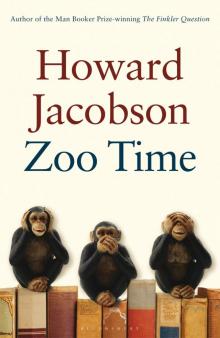 Zoo Time
Zoo Time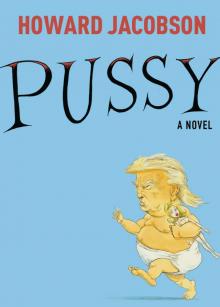 Pussy
Pussy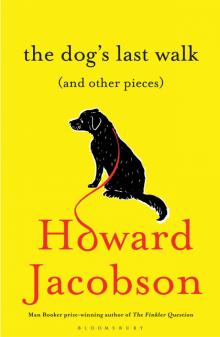 The Dog's Last Walk
The Dog's Last Walk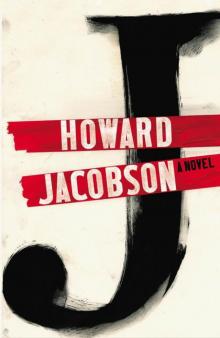 J
J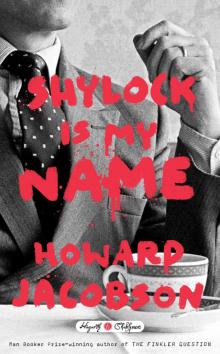 Shylock Is My Name
Shylock Is My Name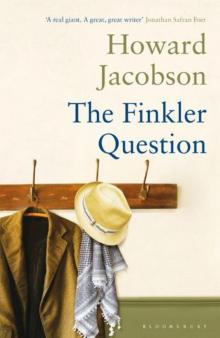 The Finkler Question
The Finkler Question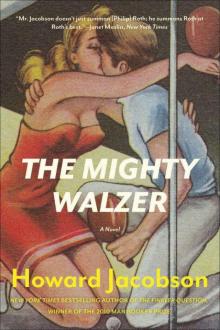 The Mighty Walzer
The Mighty Walzer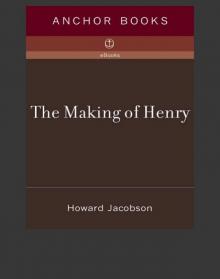 The Making of Henry
The Making of Henry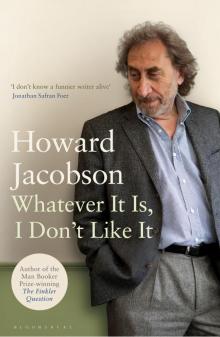 Whatever it is, I Don't Like it
Whatever it is, I Don't Like it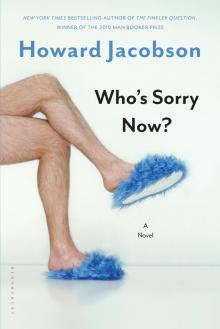 Who's Sorry Now?
Who's Sorry Now? Kalooki Nights
Kalooki Nights